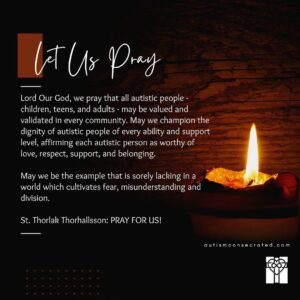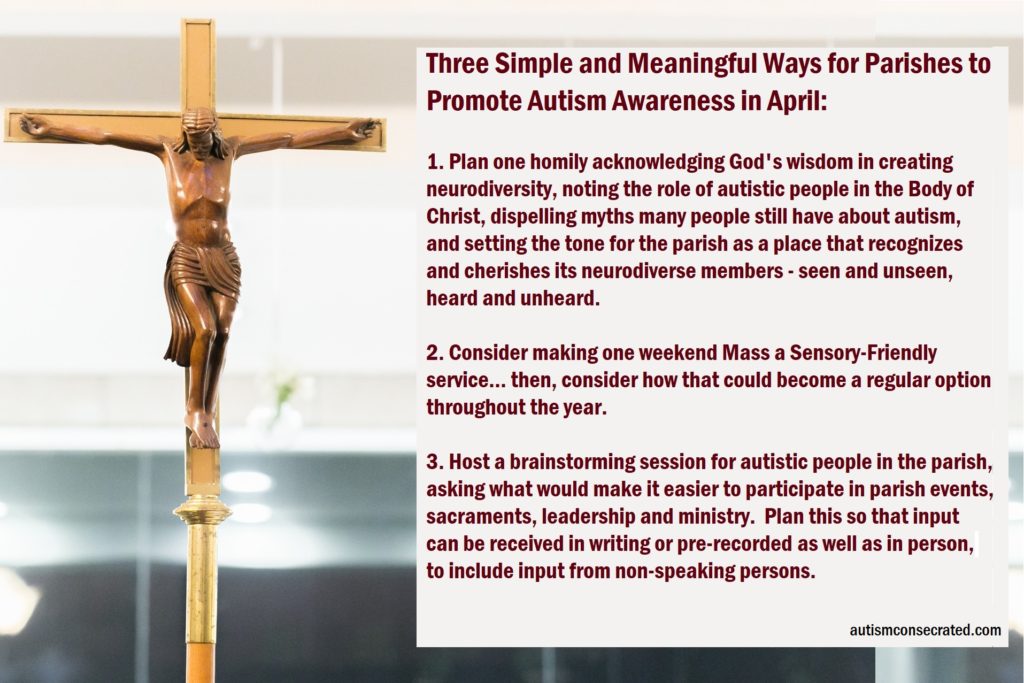by Aimée O’Connell, T.O.Carm., and Fr. Mark Nolette
Maybe you’ve sat with a doctor or therapist and gone over questionnaires. Maybe you’ve done your own research in books and online. Maybe it’s for your own needs, and maybe it’s for a loved one. But here you are, with the name of something concrete – Autism, ADHD, Anxiety, Depression, Bipolar, Borderline, OCD, or similar and related diagnoses – along with a list of best practices, a plan for therapy, maybe even a prescription. It is a relief to know what you’re dealing with, and to have an outline of how to deal with it.
Then, you’ve got your faith to get you through. You’ve got church, the sacraments, a support network of wonderful, caring people, and a wealth of spiritual reading and podcasts to encourage you. You might have a gratitude journal and some Scripture quotes at hand, and inspirational books by renowned authors who remind us that with God, all things are possible, and we can do all things through Christ who strengthens us.
So, why isn’t it working?
Why do we still feel empty?
Two possibilities: Burnout, and spiritual impostor syndrome.
“Burnout” here is not the idea that we need a vacation or that we’ve gone too long without having fun. “Burnout” here refers to neurological exhaustion, below the conscious level, which is not something we can manipulate with willpower or even completely prevent, if we are neurodivergent. Our bodily processing systems run 24/7, and anything we do that requires executive functioning (which is… everything) will add to the neurological processing load. Negotiating our sensory environments, both by having to filter out the excess stimuli imposed by our surroundings and by having to seek baseline stimuli in places we are forced to be still, contribute to that load. As our executive functioning begins to suffer, our capacity to be chipper and peaceful diminishes, and criticism from those around us increases. Burnout is whenever our load has been maxed out longer than we have been able to keep up. Basic neurological rest, a necessity for neurodivergent people, is portrayed as a luxury in the minds of most people, and not something we are typically allowed to do until after burnout begins.
In short: For neurodivergent people, depression and anxiety (and other mental health crises) are more often symptoms of burnout than standalone diagnoses.
To use an analogy, physical pain is often a symptom of something more complex at work. We can diagnose pain and treat it, and even take steps to prevent it, but if there is something beneath that pain – like, say, cancer – then treating the pain alone will not solve the problem, and our health will continue to deteriorate.
Here are some specific reasons why focusing only on depression, anxiety, and other mental health crises, is problematic when burnout is at play.
- Most therapy techniques and self-help books on depression, anxiety and mental illness, including spiritual books, describe and employ behavioral approaches which require conscious control over our emotions and motivation – giving no thought to the health or capacity of our neurological infrastructure.
- Any coaching, advice, therapy or self-help/spiritual book ought to account somewhere for the fact that moods, motivation and executive functioning depend on the health of our neurological infrastructure. Some do get there eventually, but usually it’s after a lot of focus on and unpacking surface symptoms, behaviors, and “attitudes.” Meanwhile, our neurological burnout continues unaddressed and depletes us (or adds to the deficit) even further.
- Expecting anyone to feel gratitude, maintain motivation, or make resolutions when our neurological infrastructure is maxed out is unrealistic, a recipe for failure, and potentially harmful.
- Neurological exhaustion is treatable with significant lifestyle adjustments and accommodations which need to be available at all times, not just until “things get better.”
To date, I know of no Catholic or any spiritual resources specifically addressing neurological exhaustion and burnout, or its effects on our spiritual lives. (Please, tell me if they are out there and I have missed them!) Which then leads to the next point: Spiritual impostor syndrome.
Neurodivergent people have very likely grown up being corrected and taught how to act in ways that are prescribed to and imposed on us, not spontaneous or authentic. We learn social scripts, and how to suppress big emotions, and how to behave well enough to be accepted by others. The cumulative effects of masking are just now beginning to be researched, and the impacts are dire. Human beings are not meant to follow scripts, nor are we meant to do things to earn other people’s approval – but this has been the thrust of most therapies and therapeutic techniques, even those best-intentioned, and it is what most people think of as “the right thing to do.”
A lifetime of masking our authenticity and working for other people’s approval takes a big spiritual toll. “Impostor” syndrome is what happens when scripts are “imposed” on us by people in charge. Their love or affirmation of us is entirely dependent on whether we follow their scripts. These scripts do not reflect our true needs, but nearly always reflect the “needs” of the people in charge to control and manipulate us. As a result, even when we follow the scripts and earn the approval of these people, we feel empty and hollow. We feel like impostors. If this was our experience as children, we are very likely to imagine God as also imposing scripts on us that have no relevance to who we really are and that His love and acceptance of us are wholly dependent on our following the scripts. It’s what happens when the scripts become God.
How, then, do we take ourselves to prayer before God? Can we trust that we do not have to earn His love, too? Can we face God after we have unknowingly cooperated with our own shunning, cloaked in the idea that our neurological needs and expressions need correction (or that our traits are loathsome, bothersome, too much, not enough)? How can we forgive ourselves, and those whom we trusted?
How can we trust God?
Sometimes we might also need to ask –
Where has God been in all of this?
Why did God make me this way, only to let everyone tell me I’m defective?
Haven’t I suffered enough? Haven’t I already died to myself, over and over and over, ad nauseam?
If I am beautifully and wonderfully made, why am I still not good enough?
Any true “therapy” that deals with “impostor” syndrome begins with a fundamental sense of being loved by God that cannot be contained by or flow from any script. It is analogous to what happened to Saul of Tarsus on the road to Damascus. In the light of the love and grace of God, the scripts lose their power as their inadequacies become evident. The person who has been so touched by God will then need some time to rethink and reprocess his or her whole life in the light of the knowledge of being loved by a gracious God!
No spiritual resource on depression, anxiety, mental illness or even neurodivergence can be adequate by itself without looking squarely at these questions and entrusting the answers to God’s merciful love.
In the meantime…
Yes: We are loved by God.
Yes: We are beautifully and wonderfully made.
No: People may not have steered us in the right direction, as far as how we can thrive as neurodivergent people. That is only just beginning to come into the mainstream narrative. Good intentions are still good, but methods can also be re-examined and revised based on what we know better now.
No: Our moods or executive functioning capacities are not indicators of our spiritual skills, or our goodness as human beings, or our belovedness by God.
Yes: Gratitude journals are good things. But, No: They are not the hinge on which our mental health rests. When we are neurologically rested, we have the capacity to be grateful for many things. When we are neurologically exhausted, we need to focus first on restoring our neurological health, and then we can both think about and authentically feel gratitude. Imposing it on us, however it may be packaged, makes us… impostors.
To be continued.








